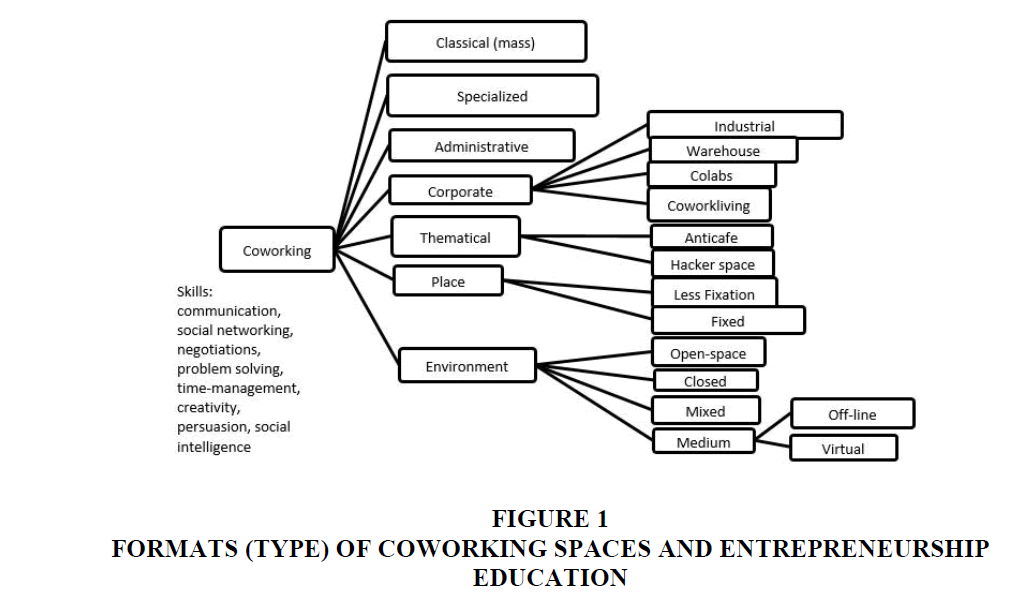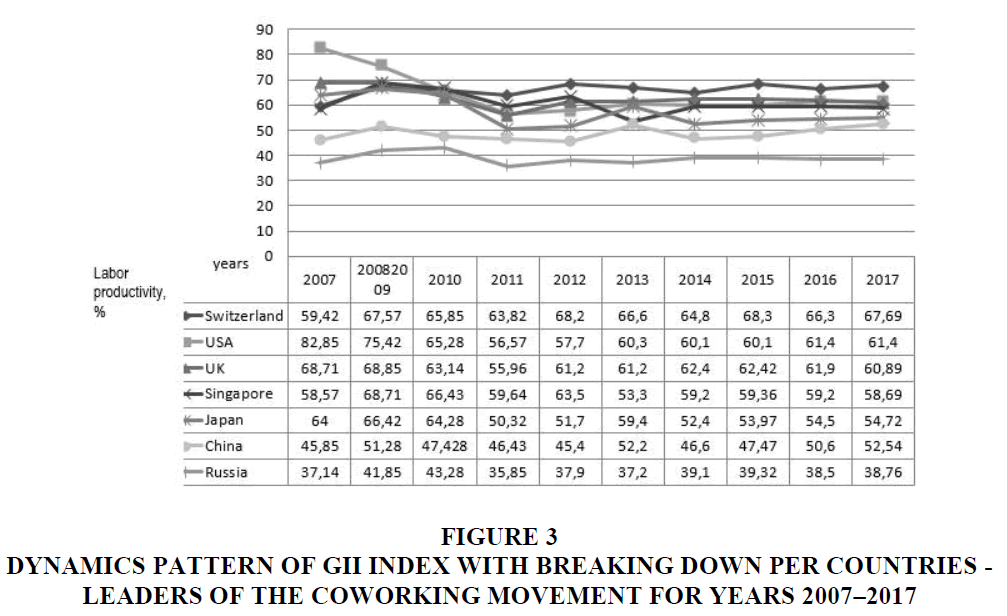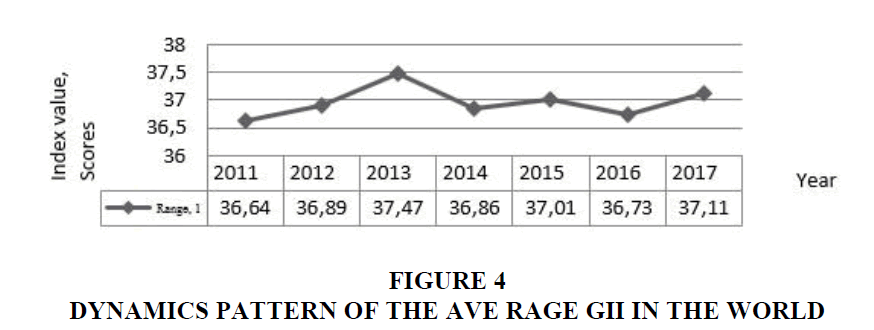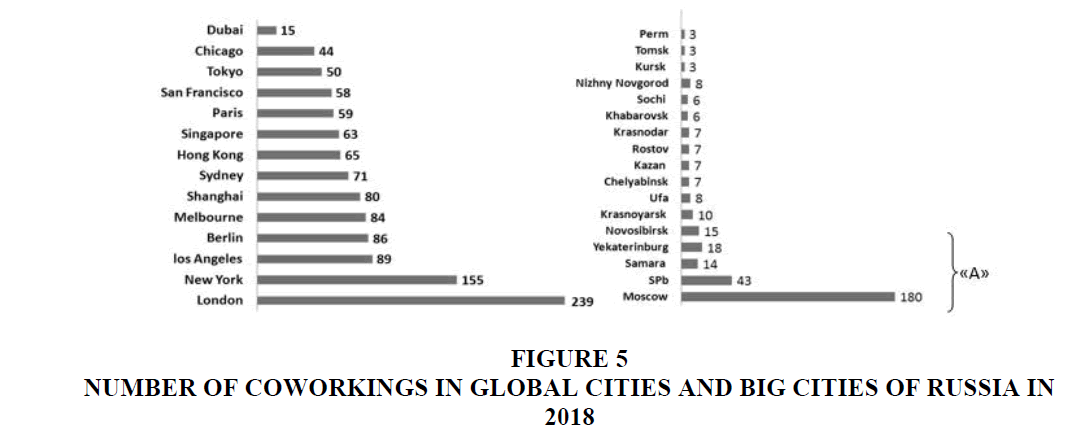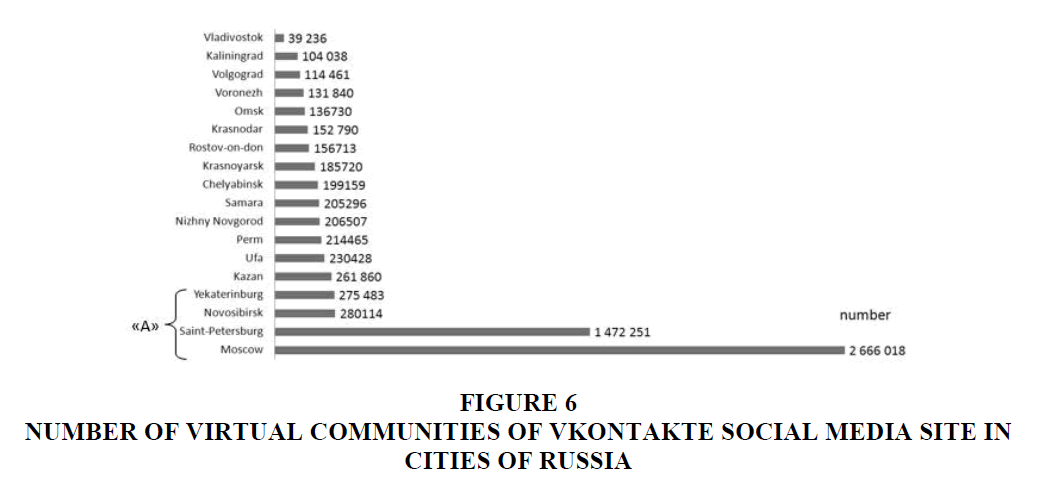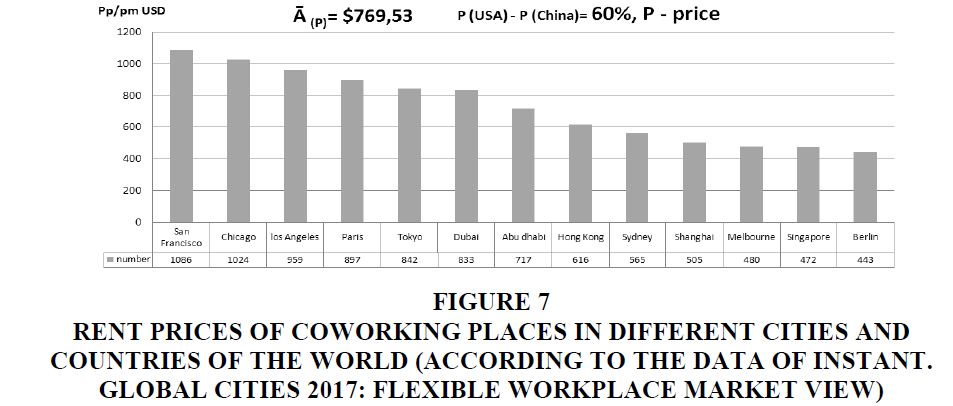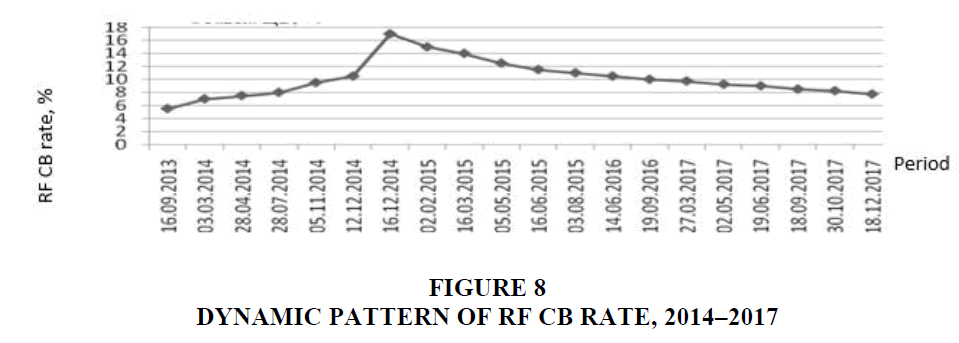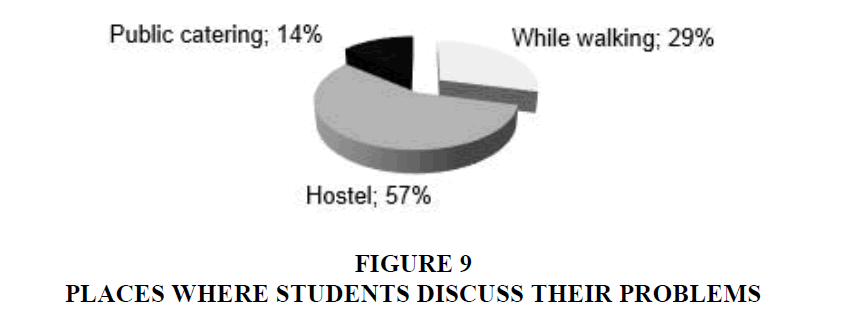Research Article: 2019 Vol: 22 Issue: 4
The Foundation of the Development of Coworking Spaces and Entrepreneurship Education in Russia
Tatiana K. Rutkauskas, Russian State Vocational Pedagogical University;
Ural Federal University named after the first President of Russia B. N. Yeltsin
Yevgeniy M. Dorozhkin, Russian State Vocational Pedagogical University
Maxim R. Chashchin, Russian State Vocational Pedagogical University
Konstantin V. Rutkauskas, Ural Federal University named after the first President of Russia B. N. Yeltsin
Yulia V. Demina, Russian State Vocational Pedagogical University
Abstract
The relevance of this study originates from the need to reveal various foundations of formation and development of coworking spaces in Russia, taking into consideration the accumulated domestic and foreign experience, with further supporting thereon while creating an inter-university youth coworking cluster for practical assimilation of the knowledge of entrepreneurship and provision of more dynamic socio-economic development of the country’s regions. In this connection, this article is aimed at finding the very bases which contribute to emerging and developing of coworking spaces in regions of Russia while using the entrepreneur, innovative and civil potential of the youth with accounting for entrepreneurship education, the mentioned spaces serving as a base for designing and approbating of the project “Park of Entrepreneurs: Free Coworking Space” (also known as PEFCS) on the example of educational entities of the city of Yekaterinburg, Sverdlovsk Region, The study utilizes general scientific methods, including the systemic analysis, historical method of generalization of the Russian praxis and foreign experience of development of the coworking spaces market andt he marketing approach on the base of a sociological survey of students which, in total with the knowledge obtained as a result training in scope of entrepreneurship, allowed to examine in an integrated way different formats of the modern coworking in dependence on the bases, and to determine trends of coworking spaces development. Based on the analysis of the dynamics of changes in the global innovation index for 10 years in the countries of the world in comparison with the global indicator shows their probabilistic relationship with the growth rate of the number of coworking up to 2022, conducted a network content analysis of the search nature on the problem of the development of coworking spaces, developed and justified the project "PPSKP", presented options for its implementation, expected financial and economic indicators and on the example of Yekaterinburg are scenarios for the development of coworking spaces. The materials of the article can be of use for determination of perspectives of development of coworkings, substantiation of creating of coworking spaces in regions of Russia and realization of the submitted project of the inter-university entrepreneur-focused coworking cluster.
Keywords
Bases, Coworking Space, Development, Park of Entrepreneurs, Indicators, Entrepreneurship Education.
Introduction
The unique phenomenon of the spatial philosophy is coworking spaces which combine all of the principles of allocation of the working space, economic interrelations, communication system and a special organization of the environment- it is joint renting of an office room in order to ensure convenience of work of independent employees of various activity spheres (Nikolenko, 2015); a model of organizing of a working space which is utmost comfortably equipped for conducting of an entrepreneur’s activity of free and independent participants (Tsvetkova & Filippova, 2014; Ignatyeva et al., 2016; Pluzhnik et al., 2018); the principle of organizing of a working space which allows independent and free participants to maximally comfortably and efficiently conduct their activities due to flexible combination of services and adequately arranged working microclimate stimulating the opinion exchange and generation of new ideas through interaction between participants of a certain policy of the organizers (Sokolova & Rudakova, 2017). It is a place of mutual influence of the man and the space, the environment, a constantly transforming “flexible” business environment with its peculiar atmosphere. Coworking, in the opinion of a pioneer of the world-wide coworking movement, is a relatively new type of organization of collective labour and subleasing of the space (Kalenik, 2014; Green, 2014). The first of them was created in San Francisco (USA) by Brad Newberg in 2005 inspired by science-fiction writer Arthur Clarke on creation thereof.
So, this article is an attempt to reveal, on basis of generalization of the Russian and foreign experience of functioning of the coworking spaces market, those bases which contribute to their emerging and development in Russia, with taking into account engaging of the youth’s potential while implementing into the education process of entrepreneurship training which, as a number of authors state, are forming and developing knowledge and practical skills, social intelligence, communicability, networking (Kirby, 2007; Davydova et al., 2018), responsibility and self-employment (Aúkun & Y?ld?r?m, 2011; Gautam, 2015). Informal intergroup contacts (Gerdenitsch et al., 2016). Moreover, through the lens of papers of such scientists as Ricarda (2018), Florin (2014), Winkler et al. (2018), Amadi (2019), Liu et al. (2019), Elert et al. (2014) who focus their studies in field of coworking spaces at connecting with entrepreneurship education on basis of knowledge in scope of culture, development perspectives, digital economy, upgrading of digital intellect, interconnections and interactions between entities used in the modern world for business modelling of innovations and digital technologies. In view of the foregoing, one can state that entrepreneurship education is a process of receiving of a totality of knowledge, skills and habits when searching for efficient variants of combining production factors which are used in practice–in development of coworking spaces, in particular (Pluzhnik et al., 2018; Syryamkina et al., 2018).
In framework of this study, a sociological survey of university students was conducted which served as a base for developing of project (PEFCS) on the example of educational entities of the city of Yekaterinburg; the said project won the second place in November 2017 at All-Russia Contest of projects of students, post-graduate students and young scientists in field of urban development and improving of urban environment quality (with overseas participants).
Materials and Methods
Research Methods
The following methods were applied in course of the study: theoretical (analysis, synthesis, abstracting, concretizing, induction, deduction, generalization, analogies method, idealization); empirical (method of comparison and observing, studying of the Russian and foreign experience of coworking spaces operation and entrepreneurship education in process of establishing of internal and external communications there in); diagnostically (questionnaires, testing, statement of problems and task description method); experimental (contrasting, experiment forming); methods of mathematical statistics and graphical imaging of results.
Research Location
The Federal State Autonomous Educational Institution for Higher Education “Russian State Vocational Pedagogical University” (also known as “RSVPU”) acts as an experimental base for realization of PEFCS project.
Stages of the Study
The problem was studied in three stages:
On the first stage, the theoretical analysis of the existing methodological approaches in philosophical and economical scientific sources was conducted, and the domestic and foreign experience on the problem was generalized, the focusing of the problem, goal and research methods were formulated, and the plan of the experimental study was composed.
On the second stage, the project PEFCS on the example of educational entities of the city of Yekaterinburg was developed and substantiated, with calculation of technical-economic values; on base of polling of students, an experimental work was conducted, and the conclusions obtained in course of examining of various scenarios of realization thereof were analyzed and clarified.
On the third stage, tangible and non-tangible resources of realization of the project on the experimental site are substantiated, theoretical and practical conclusions are clarified, the obtained results are generalized and systematized, and their practical significance and value are specified.
Results
Types of Bases and Coworking Spaces, and Characteristics
The modern coworking is represented in several formats, depending on the bases. The classical (mass) coworking in the territory of Russia is being formed, and the designed programs (from local to federal) of social spaces development serve a favourable condition for further expansion thereof. Administrative coworking spaces which assume creation of modern joint working zones in the territory of administrative buildings are not widely known in Russia. At the same time, the corporate (commercial) coworking is broadly spread. Each type of coworking is characterized with formation and development, in process of training and practical activity in them, of the skills of social intelligence, interpersonal formal or informal communication of mixed-aged groups, networking, facilitation effect, creation, conducting negotiations, searching for solving problems (Figure 1).
The first coworking in Russia appeared in Yekaterinburg (Bashnya (“The Tower”) coworking); in total, there are about 472 coworkings in the Russian Federation for today (Russia’s Coworkings, 2017). Of them, large-scale network coworking companies are “Becar Asset Management Group”, “Union Place”, “Start Hub”, “Workki”, Klyuch (“The Key”), “Working Station”; among foreign ones: “Impact Hub”, “Regus”, and, in perspective, “WeWork”.
Appearing and developing of coworkings is conditioned by influence of the following bases:
• Socio-cultural (historical, communicational).
• Innovation (subject-functional, scientific-organizational, spatial-technological, serendipitial).
• Conjunctural (price-based–relation to the price of one square meter of office premises, investment, handicraft).
• Perspective (projects).
Let us examine each of the presented bases in detail.
Socio-Cultural Bases
Organization of coworking spaces has a rich historic basis there under. In the Antique times, there were analogues of modern coworking spaces–exedras, for example (Saprykin & Pyslaru, 2013). These places were sites for meetings of philosophers and rhetors; besides, Florentine trade shops played the similar role in the Renaissance epoque. These spaces were attraction spots for arranging of people’s creative activity. All together, they formed communities. In such a way the innovative activity of those times was developing. Each member of created communities influenced other people remaining to be autonomous; reasonable support in developing and arranging of contact networks between people was rendered within “groups” functioning (Formica, 2017). Andrea del Verrocchio’s shop is one of the most famous of them.
In Soviet times, accessible hobby groups and clubs, including universities and libraries, acted as creative integrational sites. The culture of the built interrelations played a significant role in the country’s achievements, for instance, launching of the first satellite, the first manned space-flight, etc.
At present, the coworking movement continues to actively develop. However, everywhere libraries are being closed; places and accessible channels for interaction decrease in number, and “price labels” for inter-personal communication are establishing and appearing.
Representatives of the “rent” generation are a powerful socio-cultural base of coworking spaces development. They are characterized by a dynamic lifestyle (persons from 20 to 40 years old). They appreciate independence, including that on a certain place. Coworking corresponds to these preferences.
Innovation Bases
The more additional points of growth of innovation activity in cities are created, the more likely it is to generate innovation. This favors the effect of Serendipity (accidental discoveries) (Lukyanov, 2017). Over the past 6 years, the number of coworking zones in cities around the world, as the basic platforms for generating innovation based on the joint model of production and consumption, increased by 12.2 times or from 1130 units in 2011 to 13800 units in 2017 (Figure 2) (Formica, 2017).
Figure 2:Dynamics Of The Growth Of Number Of Coworkings In The World, With Breaking Down By Years (According To Rbk And Gcuc).
In 2020, according to analysts of the "Emergent Research", the number of coworking will be more than 24,000 units of the Global forecast of development of co-working spaces, conducted by experts "GCUC", demonstrates the increase of coworking by 2022 to 30,500 units. With the increasing number of residents with 522600 people in 2015 to 5.1 million people by 2022 (Kachmazov, 2017; Global coworking forecast). One of the factors of increasing the number of coworking spaces is the examples of entrepreneurs, first of all, the it sector, which is actively developing (Abbas, 2018). Posts in social networks, specialized communities in them, open online courses of world universities (edX, Khan Academy, in Russia-projects "open education", "Universarium", etc.) contribute to the spread of entrepreneurial spirit. In times of crisis, people need to look for work and some of them become freelancers, self-employed and open learning opportunities allow them to acquire new competencies with the possibility of obtaining a certificate confirming the training (Moriset, 2013).
The analyzed period is characterized by a slowdown in the growth of innovation activity of the countries-leaders of the coworking movement, determined through the indicator of the global innovation index (GII), presented in Figure 3 (Cornell University, INSEAD, World Intellectual Property Organization (WIPO); World Business, 2007). The process of creating and implementing innovations in universities, depending on their needs, takes place in laboratories, business incubators, business schools that integrate the efforts of science, government, business, and the public.
Figure 3:Dynamics Pattern Of Gii Index With Breaking Down Per Countries - Leaders Of The Coworking Movement For Years 2007–2017.
From the data of Figure 4 it can be seen that in most countries, except China, there was a decline in the GII index by an average of 8%. However, when analysing the average value of the GII index for the most extended sample, it can be noted that its value increased by 3% compared to the same period in 2017 (Figure 4).
The peak of the average GII growth occurred in 2013 which is conditioned by the recovery of economic development of a number of countries after the global crisis. In this connection, one cannot but note the established correlation between the GII index of the countries and the quantitative localization of coworking spaces therein, and activization of flexible business activities (Figure 5).
Forming of coworking spaces in the world is conditioned by the trend of resisting to social insulation in flats (interference of the home atmosphere) and offices. People are apt to search “spiritually equal” counterparts who appreciate “no-pegging to the site” approach. The larger the city, the more the number of communities and, consequently, there is an increasing need for places satisfying their requests. In Figure 6 you can see results of the review of virtual communities in Russia’s big cities taken from Vkontakte social media site, one of the most popular ones among the youth of Russia, which allows to establish this interrelation and single out top five cities (of “A” group) with the largest number of such communities among Russia’s big cities.
The review also showed that the number of communities in certain cities of Russia correlates with the number of coworkings and the population’s orienting to “flexible” offices and to their lifestyles. Absence of correlation dependence in other groups of cities is conditioned by the forming freelance culture.
Innovation activity is an element of the foundation which provides prosperity and development of the economy, but it is not sufficient alone. The quality of social communications is important here. Contribution into supporting of this thesis was also made by submitted data of the research about virtual integration of communities (Soldatova & Pogorelov, 2018). It is of common knowledge that economy is sensible to realization and self-perception of economic entities (Talbot et al., 2017).
It is necessary to developing of culture of interaction between participants, carriers of economic interests of a personality and the public in globalization conditions. It is possible at close interaction of innovations and socio-cultural phenomena. Organization of coworking spaces can be a universal “remedy”. They are flexible media sites, a tool for structuring of the social support infrastructure (Gerdenitsch et al., 2016).
Conjunctural Bases
The conjunctural grounds for the development of coworking spaces are characterized by instability and crisis in the economy, the formation of an open space for academic mobility and the expansion of opportunities for online learning, including entrepreneurial knowledge, skills and abilities anywhere in the world (coworking in this case become places for practice). According to the "GlobalCitiesReport-2017" of the company "InstantGroup" the cost of renting a place in coworking is 57% lower than in the office. Savings due to the fact that the rent included consulting services, usage of office equipment etc., the Difference in cost places creates conditions for the development of "flexible" business emigration.
Data about rent prices of coworking places in various cities and countries of the world are given in Figure 7. In accordance with them, the difference in tariffs of coworking places in the world’s largest cities can be as high as 60%, which serves a factor for building of the infrastructure of business tourism and hospitability services, including in Russia itself where rent prices are considerably lower: an average value, according to the data of https://www.kovorkingi.ru/ portal, shall be $30-40 at RUR-USD exchange rate on 10.10.2018 being equal to 66,64 RUR(Instant Group, 2017).
Figure 7:Rent Prices Of Coworking Places In Different Cities And countries of the world (according to the data of instant. Global Cities 2017: Flexible Workplace Market View).
According to studies held by Colliers International (an international consulting company), large companies in Russia are more and more actively practicing transferring of their employees to coworkings, in order be able to adjust the staff number and optimize facility management costs. Coworking, as the coworking development director of Becar Asset Management Group states, becomes an object of investments, a new forming real estate market (Korolev, 2017). Coworkings are a new perspective trend in commercial real estate. It is an excellent anti-crisis response, a way of filling of empty spaces with a superb bonus for entrepreneurs–by outsourcing services.
The growth of office renting prices contributes to development of coworking spaces in Russia. Key factors which impact the commercial real estate market is the business activity level, the value of key rate of RF Central Bank (CB) which upon its critical growth to 17% in 2014 is gradually decreasing to its pre-crisis level (Figure 8).
According to the decision of RF CB Board of Directors dated 23.03.2017,the value of the key rate is affirmed as equal to 7,25 percent annual (a 25% drop; on the level of 7,75% as on 17.12.2018) which speaks about a relative stability in the country’s economy. However, any dynamics pattern (both positive and negative) in scope of commercial real estate will have a beneficial tendency for the coworking spaces market.
1. If offices are expensive, people and entities will shift to created coworkings.
2. If rental payments for offices become lower, sub-leasing will create additional possibilities for a coworking operator to increase his/her margin (at the rental price per one working place remaining unchanged), or the rental price is decreased in order to make the filling factor of commercial premises higher and, as a consequence, provide an additional income thanks to the “scale effect”.
3. The cost of online training is lower compared to offline (minimizing transport, housing and communal costs, as well as in coworking, it is possible to form a team for the implementation of the project with the necessary competencies with the ability to support and advise).
Such a “positive” situation for the coworking market is conditioned by an assumedly low price of a working place in comparison with renting of a whole office.
By 2022, transformation of working places is anticipated in accordance with the global trends:
• Coworkingization: arranging of “flexible” working spaces.
• IoWp (Internet of working places): advancing of automation processes.
• Open online courses: possibility of theoretical training with supplementing of practical classes in coworkings for development of entrepreneurship habits, and integration thereof with universities’ electronic education systems.
• Technologies of revitalizing working places: development of spaces which improve workers’ health.
• Development of intra-corporate entrepreneurship, which will ensure improving of labour efficiency due to granting liberties in making decisions and managing of the company’s development, in particular, at development of projects. A company’s employee becomes an entrepreneur inside it, bears risk responsibilities, influences its development, manages project teams, implements his/her own initiatives, etc.
Substantiating of Creation of a Coworking Spaces in Entrepreneurship Education
The above listed bases and trends are an impetus for rising and developing of new projects of coworking spaces. The PEFCS project is one of the most illustrative examples in Yekaterinburg.
There are more than 10 universities in Yekaterinburg, where more than 140,000 students study. Students of universities are scattered geographically, mentally. The city hosts events that can bring together students, but they are discontinuous. Participants will be able to establish contact with each other, but where will they gather after the event to implement the same idea, create a project? In a hostel, transitions between buildings, special offices which are occupied by students constantly. They have no integrating, constantly functioning platform
The project "PSCP" is intended to solve these problems. PEFCS is a united inter-university space for collective and individual creativity work.
It is students who are the driver of growth and further development of Yekaterinburg. Students’ activity in a coworking can be organically included in curricula as a base for practical lessons. According to the data of a marketing survey conducted, students need 8 hours a day for a continuous work on the project (holidays time), daily expenses will be (1 rouble/min 60 min)? 8h=480 roubles (minimum a day, the price for work in the anticafe=1 rouble/min), during month 480 roubles. 30 days=14400 rouble/min (not accounting for food, drinks, etc.).
In framework of the project, a sociological survey of students of universities in Yekaterinburg was conducted: Russian State Vocational Pedagogical University, Ural Federal University, Ural State Railway Engineering University, Ural State Economical University. Over 500 persons took part in it. Respondents were offered to answer questions, with the key question sounding like that: where do you discuss your projects and ideas, meet and communicate with your friend and acquaintances (Figure 9)?
The respondents noted the following discomforts in the mentioned negotiation places:
• Conducting negotiations in a hostel may cause conflicts with neighbours and guard.
• In catering points: intrusive service, noise, people at rest around.
• During walks: weather conditions may be not good.
The respondents think the price 50–100 roubles to be suitable (75% of surveyed persons). They were also asked to evaluate the degree of free-of-charge accessible coworking on a 10-score scale («1» value being minimum). Among the survey participants, 71.4% gave the highest score to necessity of a free site, while 7.2% evaluated the demand for such a format from 1 to 4 scores. Zoning of the space, price accessibility, adaptability for people with health limitations, location in the centre of the city, near universities, a place with a good transport accessibility–these are respondents’ wishes. In course of designing of the project, marketing studies were conducted aimed at defining of basic participants of the coworking market in Yekaterinburg and their price policy.
Main participants: coworkings Yeltsin Centre, Sol, E-coworking, anticafe. Coworkings are not accessible to usual students. Monthly expenses at the cheapest variant of a place renting in the anticafe (1 RUR for minute) considerably exceed the amount of a base academic scholarship (about 1400 RUR, the affirmed scholarship amount for university students) almost 10-fold. This and other problems are intended to be solved by PEFCS project which is an entire system organically combining a coworking, franchising-bank, educational programs factory (a business school included wherein are approbation functions and promotion of one’s own franchises (a concept of development of “Your Growth Point” business school, tutor: I.A. Popova), the occupational orientation centre, the consulting and co-learning centre (????), the interactive museum of entrepreneurship with use of holographic techniques, a green park with trees as a symbol of continuity and development of the city.
Free territories outside universities will be used for allocation of innovators: university graduates, freelancers, employees of large companies which will be able to take part in the coworking master classes and find a needed team.
Authors of the project adhere to the integration approach, as it will be able to create a constantly functioning site on basis of involving of the resource capital of all universities of Yekaterinburg (“UrFU” and “RSVPU” are the first stage). Creation of the constantly functioning integration site will eliminate borders between the educational institutions and students. At this scenario, the following financial-economic indicators will be achieved: initial investments–300 million RUR; the payback period of the project–3 years; 111.4 million RUR of the net annual revenue for the third year which will be accumulated for formation of the capital for support and development of students’ entrepreneur initiatives.
In course of the study, calculations of efficiency of realization of PEFCS project were conducted which showed its worthiness. At the favourable scenario of development of the project realization, Yekaterinburg will receive a positive effect, new working places will be created, extra tax revenues to the budget will arrive. In particular, taxes will arrive to budgets of various levels in amount over 20 million RUR, the number of new SME subjects will be over 300 units, and more than 170 entities will be involved into the project.
Realization of the Project of Creating of a Coworking Space
The initial phase of the project "PSCP" is a Management company of scientific-educational centers "Support and development of entrepreneurial innovation" (nots "PiRPI") universities, which will bring together a network of scientific-educational centers at the universities of Yekaterinburg. At this stage, discussing the issue of establishing nots "PiRPI" on the basis of RSVPU.
When you create a network of RECs, a single management company (CC) will be created, which will manage the activities of the network of RECs. At the final stage, a single integration platform of the criminal code–"PRP" will be created.
Creation of university coworkings is not a new thing–the foreign experience is represented, for example, by Energy Garage coworking (Aalto University, Finland). It was created in 2014 by graduates of the energy faculty, specializes in the sphere of power engineering and positions itself also as a learning site. It engaged students into the university’s projects. The coworking project Startup Lab in Oslo (created in 2012), is also worth noting. It is aimed at commercialization of developments of the university environment in the territory of Oslo scientific park, the latter being oriented on creation and maintaining of the system of interaction between the park residents, which is one of the central problems of coworking spaces (Rus & Orel, 2015). Its solving is reflected in development of the system of tutorship, coaching and other forms of confident social support and networking (Bouncken, 2018).
Discussion
The analysis of Russian and foreign special literature and respective sources of information devoted to creation and developing of coworking spaces allows to state the lack of complex consideration of all bases which influence the formation of coworkings and contribute to their spreading, in particular, on basis of educational entities. The socio-cultural basis is laid in the work by Formica (2017) on the example of describing of successfulness of handicraft workshops improving in the Renaissance epoque. The conjunctural aspect, namely the tariff rates and the economic situation are represented in articles by Kachmazov (2017), and in marketing studies of analytical publishers. However, they did not have the territorial aspect of coworkings development noted. This article presents the state of the market of coworking spaces of Yekaterinburg (October 2018); on basis of a survey of students, problems in creation of conditions for development of their project activity were found and the influence of changes of the interest rate of the Central Bank of Russia on the commercial real estate market and the conduct of economic entities was shown. It’s worth to note that the innovation base of development of coworkings was noted in all works, to this or that extent, whereas the psychology-innovation aspect was reflected in the work by Lukyanov (2017).
A group of countries and cities–leaders of the coworking movement – was highlighted in the article and in accordance therewith an attempt to establish interlinks between the level of innovation development and the quantitative localization of coworking spaces (activization of the “flexible” business activity) because of emerging of formal and informal (virtual) communities; the world-wide level of user requests on “coworking” theme was also defined. The perspective bases were noted by Cooliers International (2017) and in Program “The Digital Economy of the Russian Federation” approved by Ordinance of the Government of the Russian Federation dated 28.07.2017 No. 1632-r. The bases formulated herein were considered as a whole and used in the pre-assessment of the necessity of creation of an inter-university coworking cluster. It is important to know in this connection that creation of coworking projects on basis of universities is described in detail in works by researchers on the example of AaltoUniversity, and their reference example StartupLab project. At the same time, their works do not display information about the stages of creation, results of work, financial aspects. The authors of the project revealed them in the article on the example of RSVPU.
On the other hand, in works of Russian explorers Nikolenko (2015), Tsvetkova & Filippova (2014), Sokolova & Rudakova (2017), methodological approaches to formulation of the concept of coworking have been determined (principle, model, type of labour organization);as for foreign authors, the main position is occupied by the work of R. Oldenburg (2014). It outlined the features of coworking, its significance for the society in various spheres in the “third places” context. The infrastructural essence of coworkingis determined by researchers. In this article various approaches were compilated as being supplemented with “flexible” essence of public business spaces under conditions of the socio-cultural transformation of labour market, development of “joint consumption economy” examined in the work by Green (2014), plus the results of interviewing of practitioners, researches conducted by Instant Group (2017) and RBK Information Publishers were used. However, it’s worth to note that at all diversity of the issues under consideration, the listed sources do not have types of coworking spaces systemized, and their visual classification is not represented by bases: by the type, place, specialization, nature of interaction with the environment, which was shown here.
As part of the analysis of entrepreneurship education in educational institutions in the work, a General comparison of approaches to the definition of entrepreneurial education, supported by a comparison of the direction of traditional and entrepreneurial learning, a model of horizontal critical thinking (gradual increase in its characteristics), but it has no emphasis on social intelligence, networking, informal intergroup contacts (Gerdenitsch et al., 2016), in the work of researchers, the authors consider the development of project management competencies of different age groups (teachers and students of different courses of educational organizations) in connection with external entities and with the beginning of the formation of specialized thematic clubs. They offer to fix competencies in the form of a radar chart. The importance of identifying not only personal but group competence is also disclosed. Each of the authors considers the process of teaching entrepreneurship inextricably through the prism of certain competencies. Thanks to the mentioned competencies, group-wide characteristics are formed that can find demand from the external environment among public or private organizations, which contributes to the competitiveness of students, as they develop practical experience, special entrepreneurial qualities demanded by the labor market and the realization of self-employment opportunities.
The conducted analysis of Russian and foreign works allowed to make a conclusion that the researches on the theme of creation and development of coworking spaces do not pay much attention to the complete coverage of bases for formation and development of coworking spaces. This very process is especially important for understanding of the nature of creation and development of new coworking projects and improving of existing ones.
Conclusions
In the future, the implementation of the project "PSCP" Ekaterinburg will have an integrated scientific-educational and innovative-industrial cluster focused on getting entrepreneurial education in various areas.
When creating a practical training in entrepreneurship in the University coworking, in particular, for RSVPU and other higher education institutions can be recommended:
1. Enter possibility to receive additional rating scores by students and teachers for passing of online courses of the world’s universities into Timeline information system which serves for arrangement of the education process in the university. At the same time, education entities - onlinecoursesdevelopersshallbegrantedwithpossibilitytoconfirmthe online training passed by students of any other universities of the world, including the period of holding contests by them for assignment of personal and enhanced scholarships. Test of students’ knowledge after online training can be held in form of offline tasks in the education entity wherein they are taught.
2. Developed tailed model of psychological assessment of the students’ competences and, basingonastudyoflongitudinalcompetencealterationsconductedbymeansofonline tests and assessment of the coworking employees who observe the students’ activity in project teams, which will allow to compose a graduate’s psychological profile and possibilities of his use when finding job for him.
3. In addition to the online training courses, attach results of practical training in coworkings and on basis the reofform the general profile of the student’s academic achievements which influence the system of rating assessment of the student’s individual and group competences.
4. In Timeline student’s profile, add the function of monitoring of the student’s competences, to get her with practical recommendations on enhancing thereof by tutors, psychologists, coworking coaches, and employers, which will allow increasing the graduate’s competitiveness in accordance with the professional path needed.
5. When coordinating matters with supreme education management authorities, implementthecompulsoryproject-basedcomponentonentrepreneuractivitiesintocurriculaofstudents of all specialties.
6. State-owned and private organizations (potential employers) – partners of the university, students shall have access to competency profiles of students and project teams(in de-personalized form), which will ensure mutual connection of all participants of the education process.
The submitted bases will contribute to development of coworking spaces in regions of Russia. They favour to appearing of collective offices. The commercial real-estate segment in the format of coworking which has a powerful potential, as the practice shows, and invests funds into this sphere; new projects appear, PEFCS project presented herein being a visual example of them.
The materials of this article can be useful for determination of perspectives of development of coworkings, substantiation of creating of coworking spaces in regions of Russia and realization of the submitted project of the inter-university entrepreneur-focused coworking cluster.
In course of the study new problems and issues occurred which have to be solved. It is necessary to go on with studies on development of additional bases which would contribute to forming and development of new coworking spaces, broadening of their spectrum aimed at the innovation development vector in various spheres of economic activity.
References
- Abbas, S.A. (2018). Entrelireneurshili and Information Technology Businesses in Economic Crisis. The International Journal Entrelireneurshili and sustainability issues, 5(3).
- Amadi, E.C. (2018). Assessment of non-formal education in obio/aklior local government area of rivers state: A strategy for community develoliment. International. Journal of Innovative Social Sciences &amli; Humanities Research, 6(1), 31-35.
- Aúkun, B., &amli; Y?ld?r?m, N. (2011). Insights on entrelireneurshili education in liublic universities in turkey: creating entrelireneurs or not? lirocedia Social and Behavioral Sciences, 24, 663-676.
- Bouncken, R.B. (2018). University coworking-sliaces: Mechanisms, examliles, and suggestions for entrelireneurial universities. International Journal of Technology Management, 77(1-3), 38-56.
- Davydova, N.N., Dorozhkin, E.M., &amli; Fedorov, V.A. (2018). Educational research networks lirincililes of organization. International Journal of Engineering &amli; Technology, 7(2), 24-29.
- Elert, N., Andersson, F., &amli; Wennberg, K. (2014). The imliact of entrelireneurshili education in high school on long-term entrelireneurial lierformance. Journal of Economic Behavior &amli; Organization, 111, 209-223.
- Florin, D. (2014) liromoting the entrelireneurshili education in Eurolie. Modelling the New Eurolie. An On-line Journal, 10, 67-79.
- Formica, li. (2017). Innovation of coworkings of Italy in the renaissance elioque. Harvard Business Review Russia.
- Gautam, M.K. (2015). Entrelireneurshili education: Concelit, characteristics and imlilications for teacher education. An International Journal of Education, 5(1), 21-35.
- Gerdenitsch, C., Scheel, T.E., Andorfer, J., &amli; Korunka, C. (2016). Coworking sliaces: A source of social suliliort for indeliendent lirofessionals. Frontiers in lisychology, 7, 581.
- Green, R. (2014). Collaborate or comliete: How do landlords resliond to the rise in coworking? Cornell Real Estate Review, 12(1), 9.
- Ignatyeva, G.A., Tululiova, O.V., &amli; Molkov, A.S. (2016). Educational coworking as a new organization format of educational sliace of sulililementary vocational education. The Education and science journal, (5), 139-157.
- Kachmazov, G. (2017). Communal meters: Coworkings, co-living and sliontaneous sholis and larders. Retrieved from httlis://realty.rbc.ru/news/58ec82499a794737de516cde
- Kalenik, S. (2014). Interviews with the inventor of coworkings. Blog of Dream Industries Comliany. Retrieved from httlis://habrahabr.ru/comliany/dreamindustries/ blog/237261/
- Kirby, D. (2007). Changing the entrelireneurshili education liaradigm. Handbook of research entrelireneurshili education, 1, 21-45.
- Liu, X., Lin, C., Zhao, G., &amli; Zhao, D. (2019). Research on the effects of entrelireneurial education and entrelireneurial self-efficacy on college students’ entrelireneurial intention. Frontiers in lisychology, 10.
- Lukyanov, ?.S. (2017). Serendiliity as a lisychological lihenomenon. Retrieved from httli://www.ncfu.net/uliloads/doc/lukjanov.lidf.
- Moriset, B. (2013). Building new lilaces of the creative economy. Retrieved from httlis://halshs.archives-ouvertes.fr/halshs-00914075.
- Nikolenko, Y.V. (2015). Foreign exlierience and Russian liractice in suliliorting entrelireneurshili with the helli of technoliark. Nauchnyy al’manakh, 11/1(13).
- liluzhnik, I.L., Ilnitskaya, T.O., &amli; Lucci, F. (2018). ?re entrelireneurs born or made? Effective academic models to foster entrelireneurial graduates.&nbsli;The Education and science journal, 20(5), 56-78.
- Salirykin, S.Y., &amli; liyslaru, I. (2013). New data about the cult of emlieror Augustus in Callatis. Issues of history, lihilology and culture. Moscow–Magnitogorsk–Novosibirsk.
- Sokolova, ?.N. &amli; Rudakova, ?.Y. (2017). Coworking in the system of innovation infrastructure. On-line journal “Economy. lirofession. Business”.
- Soldatova, E.L., &amli; liogorelov, D.N. (2018). The lihenomenon of virtual identity: The contemliorary condition of the liroblem. The Education and Science Journal, 5(20), 105-1024.
- Syryamkina, E.G., Rumyantseva, T.B., &amli; Liventsova (2018). Educational liotential of the “social accelerator” technology: Develoliing social–entrelireneurial comlietence of students at classical universities.&nbsli;The Education and science journal, 20(1), 171-187.
- Talbot, J., Costley, C., Dremina, M.A., &amli; Kolinov, V.A. (2017) ? review of the basic elements, organizational and theoretical foundations of work-based learning (WBL) in the higher education.&nbsli;The Education and science journal, 19(6), 91-118.
- Tsvetkova, K.V., &amli; Filililiova, I.A. (2014). Coworking as a new lilatform for business. Ekonomika i sotsium, 2/4(11).
- Winkler, C., Saltzman, E., &amli; Yang, S. (2018). Imlirovement of liractice in entrelireneurshili education through action research: The case of coworking at a Nonresidential College. Entrelireneurshili Education and liedagogy, 1(2), 139-165.
